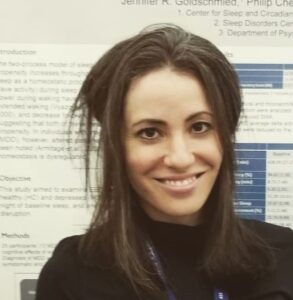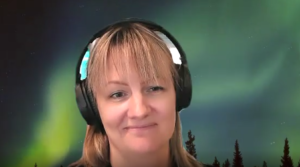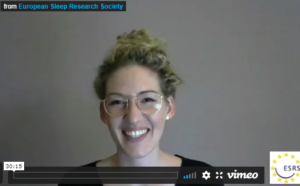Sleep Science Friday: Talking with sleep scientists
Sleep Science Friday
It’s the end of another week—grab a coffee/tea/beer/wine and end your week with a quick recap of Sleep Science News!
Sleep Science Friday: Talking with sleep scientists
27 November 2020
The last couple of weeks, we’ve been talking with sleep specialists about all things sleep, as well as what it’s like to be a sleep researcher and communicating your research. This week, we had a great conversation with Dr. Jennifer Goldschmied about the connection between your sleep, mood, and neuroplasticity; how the structure of sleep looks between healthy people and those with depression; and the surprising effects of sleep deprivation and napping on your mood. We also discussed different treatments, such as Cognitive Behavioral Therapy for insomnia (CBT-I) and different medications, including anti-depressants and new alternative treatments, such as ketamine and psychedelics.
 Dr. Jennifer Goldschmied is a licensed clinical psychologist and Assistant Professor at the Department of Psychiatry at the University of Pennsylvania (USA) and a member of the Communications and Digital Committee at the ESRS. Her research focuses on identifying mechanisms in sleep that modulate mood and emotional processing. Recently, she was awarded an NIH Career Development Award to study the relationship between slow-wave activity, neuroplasticity and mood in depression. On top of her research, Dr. Goldschmied also works in a clinical setting in behavioral sleep medicine and treats patients with sleep disorders and comorbid psychiatric illnesses.
Dr. Jennifer Goldschmied is a licensed clinical psychologist and Assistant Professor at the Department of Psychiatry at the University of Pennsylvania (USA) and a member of the Communications and Digital Committee at the ESRS. Her research focuses on identifying mechanisms in sleep that modulate mood and emotional processing. Recently, she was awarded an NIH Career Development Award to study the relationship between slow-wave activity, neuroplasticity and mood in depression. On top of her research, Dr. Goldschmied also works in a clinical setting in behavioral sleep medicine and treats patients with sleep disorders and comorbid psychiatric illnesses.
However, due to some home office technical difficulties, you’ll just have to wait to listen in!
Meanwhile, below are some sneak peeks of our conversation with Dr. Goldschmied. And why not revisit past Sleep Science Friday interviews?
Also stay tuned as next week (4 December), we’ll talk with Professor Joerg Steier (King’s College London) about his research on respiratory physiology and some exciting new developments at the British Sleep Society. This includes the BSS National Narcolepsy Update webinar on 4th December 2020. Register here!
Sneak peek: Sleep and Mood with Dr. Jennifer Goldschmied
The effects of sleep on mood can be highly variable—however, the mechanisms are difficult to disentangle.
“So, unfortunately, the quick answer is we actually don’t know what the mechanism is…for how sleep modulates mood. But we do know that sleep loss definitely does decrease positive mood and that we typically evaluate our environment more negatively when we’re sleep deprived.”
This may be partially explained by the concept that when the emotional center of our brain is activated, there may be a lack of top-down regulation to moderate the negative or emotional response when we’re sleep deprived. Another link between sleep and mood is looking into neuroplasticity. Sleep, and especially slow-wave sleep, is related to the regulation of neuroplasticity, explains Dr. Goldschmied. Neuroplasticity is also implicated in depression, where patients may show signs of impairments in memory and concentration.
Based off these observations, Dr. Goldschmied then developed and proposed a model in 2019 that suggests that it may be impairments in the brain’s ability to regulate homeostatic changes in neuroplasticity that can then lead to changes in both slow-wave activity and mood in individuals with depression. After being awarded a 4-year grant by the NIH, she is now investigating this model and will hopefully have further insights over the next several years.
Past Sleep Science Friday interviews
Sleep in the time of corona—with Dr. Christine Blume (20 Nov 2020)

Time for a Sleep Revolution (#H2020) with Dr. Erna Sif Arnardóttir (13 Nov 2020)
We hope you have a lovely weekend and are excited to join us next week for more sleep science talks!
Just published an article? Want your research to be featured? Saw something interesting? Contact: doris.wu [ at ] esrs.eu.
Not a member yet? Apply here and see our wide range of benefits, including a yearly online subscription to the Journal of Sleep Research, automatic membership to the Federation of European Neuroscience Societies (FENS), support for early career researchers via the ECRN, regular updates via the ESRS Newsletter, promotion of your research, and more.




